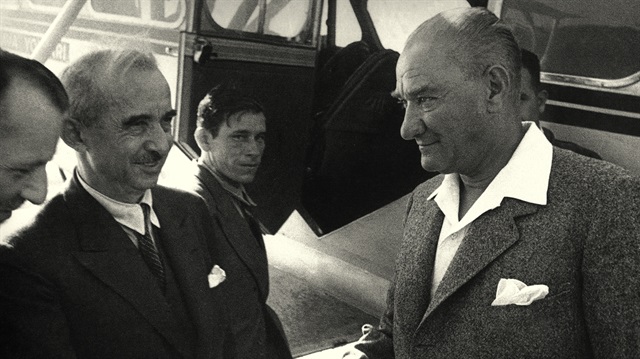
A letter sent from a minister to the Prime Minister, İsmet İnönü, in June 1938, reveals the motive and method behind the assassination of Turkey's founding father, Atatürk
Turkey's daily Yeni Şafak has brought confidential documents to the surface, unveiling the mystery surrounding the death of modern Turkey's founder Mustafa Kemal Atatürk.
The documents, which first floated publicly in the country, showed that Atatürk was maliciously poisoned with lethal doses of quinine in a plot which was orchestrated by his successor İsmet İnönü.
Pharmacologists say that quinine, if overdone, can be associated with serious complications including cardiac arrhythmias and death.
The secular state-promoted sources say that the key figure in the creation of present Turkey died at the age of 57 at Dolmabahçe Palace in Istanbul on November 10,1938, a year after he had been diagnosed with cirrhosis of the liver.
However, the truth had emerged from a letter, written by the then Interior Minister Şükrü Kaya to the then prime minister İsmet İnönü four months before the death of Atatürk.
The letter, dated June 30,1938, is inaugurated with the Minister's expression, his sadness about the preventative measures ordered by Ataturk against İnönü, but does not identify what sort of measures the late president ordered.
The minister then admits Atatürk's sickness significantly deteriorated.
According to the letter, Atatürk was driving away foreign doctors,who were invited to Turkey to treat himself,and ordered only Turkish nationals to heal his sickness, because he had serious doubts that non-Turkish physicians could deliberately prescribe the wrong drugs with the intention of killing him.
“I believe that the doctor, who was allocated for the treatment, carried out his duty with a genuine conviction. Everything seems to be on the right track and proceed the way it is supposed to be," the Minister said in his letter.
“A desire to see you as President has already appeared in all of us," he admitted at the end of the letter which culminated with his signature.
The second document,dated February 26,1959,reveals that allegations over Atatürk's death has led to veiled threats for a senior official at the top of the state.
In his letter, Kasım Gülen, the then general secretary of the Republican People's Party, or CHP, made a thinly-veiled warning against Hıfzı Oğuz Bekata, an MP from Ankara who was Şükrü Kaya's successor, not to show the report, which showed Atatürk was poisoned with overdosed drugs, to anyone else.
“Please give me back the original copy of his report. It is beyond you and it is beyond me. We cannot pull it off. Both you and I are unable to retort," said Kasım Gülen, who was also a senior member of the Grand Lodge of Free and Accepted Masons of Turkey.
The General Secretary then admits a man, he does not identify, has still some loyalists at the then National Security Service, known as MAH.
“You know very well who are involved in this issue. They can finish you. Do not take this as a threat," he said in his veiled threat.
In 1962, when he took to the Internal Affairs office, Hıfzı Oğuz Bekata requested Dr. Lebit Yurdooğlu, the deputy general secretary of CHP, to search the allegations of his death.
In his response, Yurdooğlu asserted that Atatürk was deliberately killed by the doctors who were treating him.
“When I search thoroughly, I recognized 43 bottles of quinine were used to treat malaria. Every doctor acknowledges that when using this much quinine, this can cause irreparable liver damage.I had the impression that it was as though he knowingly used it," he said in his letter, dated November 18, 1962.
“I formed the opinion that Eppinger, Bergman, Dr. Fissingera and Dr. Neşet Irdelp consciously performed their doctor's duties in an insufficient way," he added.
The allegations linked to Atatürk's death was for the last time brought into the public spotlight on June 9,2012, by the doctor of the late prime minister Bülent Ecevit.
Mücahit Pehlivan, also a former Ankara deputy from Justice and Development Party, or AK party, called for the exhumation of Atatürk's body to carry out DNA testing from his hair during a televised debate, Başkent, which was broadcasted on TVNET.
“His death does not look like it was caused only by cirrhosis. I believe an assassination could be planned by using arsenic."
Hello, the comments you share on our site are a valuable resource for other users. Please respect other users and different opinions. Do not use rude, offensive, derogatory, or discriminatory language.
The floor is all yours.








